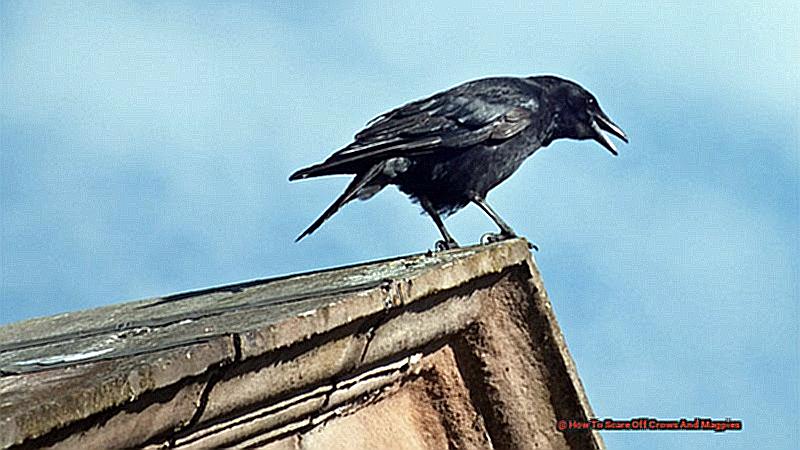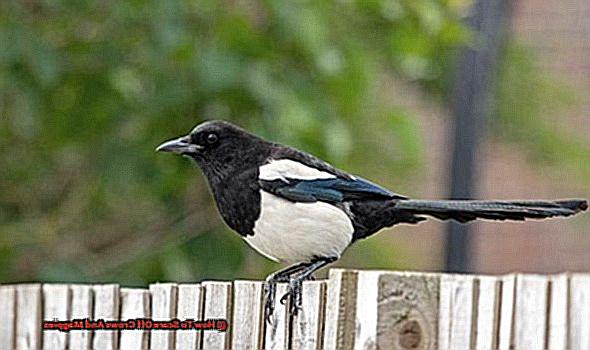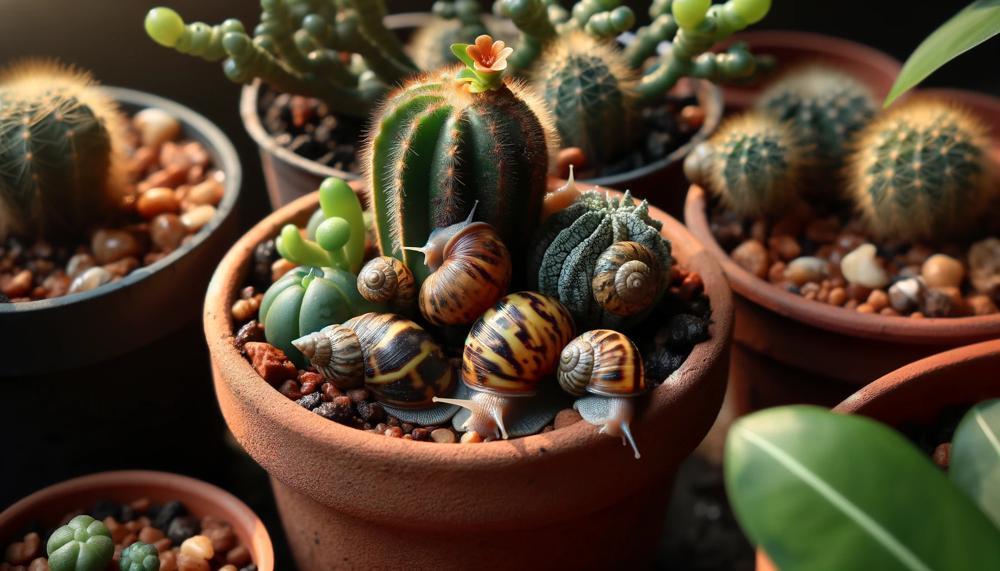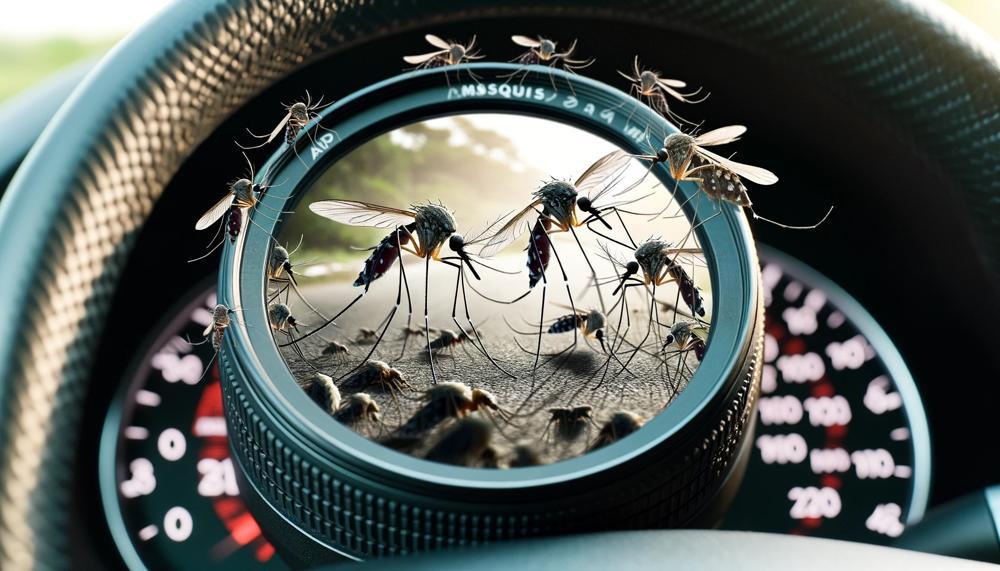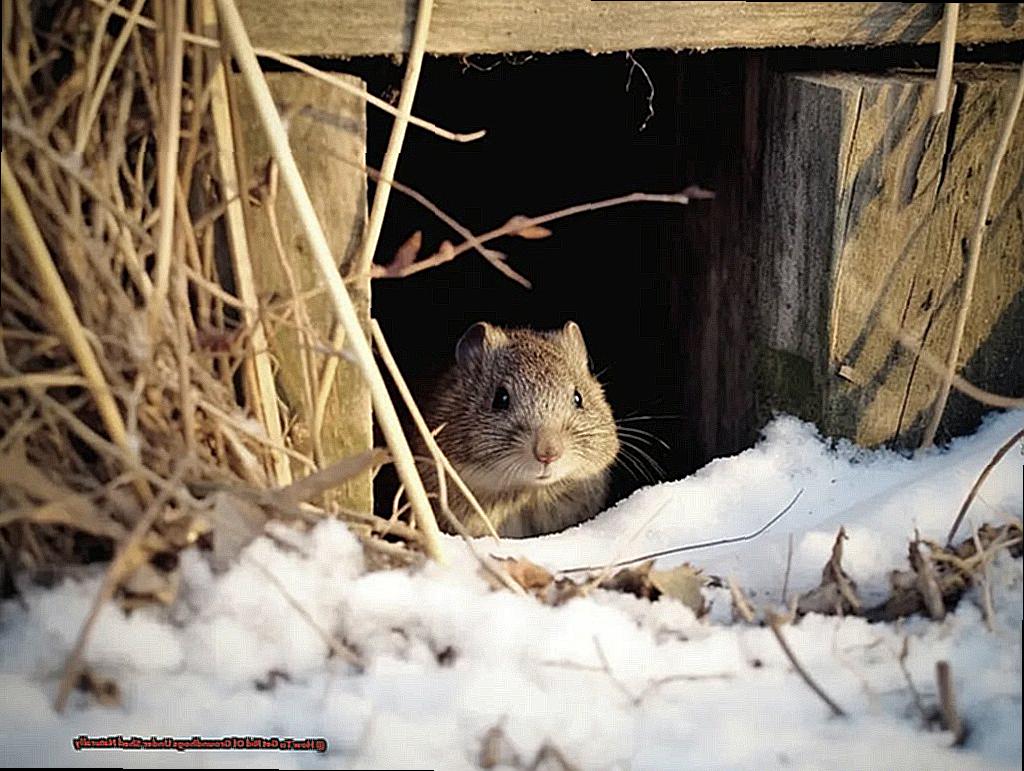Imagine this: you’re basking in the serenity of your backyard, sipping on a steaming cup of coffee and soaking up the warm rays of the morning sun. Suddenly, a raucous cawing shatters the tranquility as a gang of crows descends upon your peaceful haven, determined to steal your breakfast and wreak havoc on your garden.
Or perhaps you’re trying to enjoy a leisurely picnic in the park, only to be bombarded by aggressive magpies hell-bent on snatching your sandwich.

As magnificent and cunning as these birds may be, they can quickly turn into nuisances when they start causing damage or pilfering food. But fear not, dear reader. In this blog post, we’ll delve into effective methods for deterring crows and magpies without causing them harm or breaking any laws. Prepare to reclaim control over your outdoor space with these simple yet potent tips:
- Understanding why crows and magpies are drawn to certain areas
- The significance of deterring them early on before they become a nuisance
- Natural repellents such as shiny objects and decoys that mimic predators
- Creating physical barriers like netting or fencing
- Utilizing sound deterrents like wind chimes or recorded distress calls
With these strategies at your disposal, you can finally revel in your outdoor activities without any unwelcome avian intruders. So sit back, relax, and let’s learn how to ward off those pesky crows and magpies.
Table of Contents
- 1 Cover Fruit and Garden Vegetables With Nets
- 2 Use Special Bird Feeders That Prevent Magpies From Eating
- 3 Eliminate Bird Baths (A Popular Magpie Party)
- 4 Cover and Get Rid of Food Sources
- 5 Use Decoys to Scare Magpies Away
- 6 Play Recordings of Predators on an Irregular Schedule
- 7 Rotate Decoys Frequently to Fool Magpies
- 8 Use “Eyes” to Scare Magpies
- 9 What Will Scare Magpies Away?
- 10 Conclusion
Cover Fruit and Garden Vegetables With Nets
Protecting your fruits and vegetables from pesky crows and magpies can be accomplished by using nets to cover them. These birds are known for their opportunistic eating habits, as they will consume almost anything they come across, even if it is garbage or carrion. By utilizing nets to cover your produce, you are removing the easily accessible food source for these birds, making them less likely to stick around. Additionally, the physical barrier created by the nets makes it difficult for crows and magpies to penetrate, making it less appealing for them to attempt to access the food source.
Not only do nets act as a physical barrier, but they also serve as a visual deterrent for these birds. Crows are typically fearful of new objects and predators such as mockingbirds or humans. The presence of nets may lead them to believe that there is a potential predator nearby, causing them to keep their distance.
This method can be particularly effective when used in conjunction with other strategies, such as placing an owl house in your garden. Owls are natural predators of crows, and the sight of an owl house can discourage them from entering your property.
Moreover, covering fruits and vegetables with nets can also prevent crows from causing harm to crops and livestock. These birds have been known to attack young lambs in search of a meal, which can result in injury or death for the vulnerable animals. By utilizing nets to keep crows away from fields and pastures, you can protect your crops and livestock from potential harm.
Use Special Bird Feeders That Prevent Magpies From Eating
If you are looking for ways to keep magpies from eating your bird feed, there are several effective bird feeders that can help. These include caged feeders, weight-triggered feeders, cylinder feeders, and squirrel-proof feeders. These feeders use different mechanisms to restrict the size or weight of the bird that can access the food, making it challenging for larger birds like magpies to reach the food. Additionally, using reflective surfaces and fake predators can also be an effective way to deter magpies from feeding in your backyard.
One example of a caged feeder is the “Special Bird Feeders That Prevent Magpies From Eating.” This feeder has a cage surrounding the food tray, allowing smaller birds to enter and eat while keeping larger birds like magpies out. Another option is the weight-triggered feeder, which only opens when a bird of a certain weight lands on it, preventing magpies from accessing the food. Cylinder feeders also work by limiting the size of the bird that can enter and eat from the feeder.
Apart from these types of feeders, using reflective surfaces such as CDs or mirrors can help deter magpies as they do not like bright, shiny objects. Additionally, placing fake predators like fake owls or snakes near your feeder can also scare off magpies.
By using a combination of these methods and rotating them regularly, you can effectively prevent magpies from eating your bird feed while still providing food for smaller birds.
Eliminate Bird Baths (A Popular Magpie Party)
Magpies are quite fond of bird baths as they serve as a source of water for both bathing and drinking, crucial for maintaining their feathers and overall well-being. Eliminating bird baths can prove to be an effective way to deter crows and magpies by disrupting their access to this vital resource and making it harder for them to survive in the area.
| Why Magpies Flock to Bird Baths | How Removing Bird Baths Can Help Keep Crows and Magpies at Bay |
| Bathing helps maintain feathers for insulation, waterproofing, and flight | Disrupts access to water source, making it more difficult for them to thrive in the area |
| Bathing makes birds more agile and better at escaping predators | Creates competition for resources, making the area less appealing for crows and magpies |
| Bird baths can be potential breeding grounds for mosquitoes | Eliminates a potential food source for crows and magpies, forcing them to seek sustenance elsewhere |
| Creates a more balanced ecosystem by reducing the concentration of certain bird species in the area |
By removing bird baths from your yard, you essentially create an environment that is less desirable for crows and magpies. This compels them to look for resources elsewhere, which can disrupt their usual patterns and make it harder for them to thrive in your local area. Moreover, it promotes a more balanced ecosystem by lowering the concentration of certain bird species, making it less attractive for crows and magpies who may prefer areas with a higher density of their preferred resources.
Additionally, removing bird baths can create a sense of competition among the birds for resources. This makes the area less appealing to crows and magpies, who may feel threatened by other birds competing for the same resources. This, in turn, can help reduce their presence in your yard.
In conclusion, bird baths are a popular choice among magpies as they provide a vital water source for bathing and drinking, essential for maintaining their feathers and overall health. Removing bird baths can help deter pesky crows and magpies by disrupting their access to this resource, creating an undesirable environment for them, and fostering a more balanced ecosystem.
Cover and Get Rid of Food Sources
Crows and magpies are known for their intelligence, but they can become a nuisance when they start causing trouble on your property. To prevent these birds from becoming a problem, it is important to take measures to remove any potential food sources that may attract them. In this blog, we will discuss some effective ways to do so.
- Secure trash cans: Crows and magpies are scavengers and will often rummage through trash in search of food. To prevent this, make sure to securely cover your garbage cans with lids or bungee cords to keep the birds from accessing the contents.
- Relocate bird feeders: While bird feeders may attract other types of birds, they can also draw in crows and magpies. Consider removing or relocating them away from your property to discourage these birds from coming near.
- Clean up after pets: Pet food left outside can also be a food source for crows and magpies. Make sure to clean up any leftover food or spills to avoid attracting these birds.
- Cover compost pile: If you have a compost pile in your yard, make sure to cover it to prevent crows and magpies from foraging through it.
- Harvest fruits and vegetables promptly: Crows and magpies are known to target fruit trees and vegetable gardens as food sources. To deter them, make sure to harvest ripe produce promptly. This will prevent the birds from getting to the food first.
- Use decoys or natural predators: As mentioned in the research notes, using decoys or real predators like owls or coyotes can scare crows and magpies away from your property.
- Hang shiny objects or make loud noises: Crows dislike shiny objects and loud noises, so hanging shiny objects like CDs or making loud sounds can be an effective deterrent.
- Install deterrents: Installing bird spikes or using transparent bird gel on windowsills can prevent crows and magpies from perching or nesting on your property.
By following these tips and being diligent in removing potential food sources, you can effectively keep crows and magpies away from your property.
Use Decoys to Scare Magpies Away
Using decoys is an effective way to scare off crows and magpies, as these birds see them as potential predators or threats. Placing decoys of predators like hawks or dead crows in strategic locations can deter them from staying on your property. To add to the effectiveness, decoys that make loud noises or have shiny surfaces can serve as visual and auditory deterrents for these intelligent birds. However, it is crucial to regularly move and change the decoys to prevent the birds from adapting to them and making them ineffective. Other methods, such as using scents like clove oil or peppermint oil, can also aid in keeping crows and magpies away.
Furthermore, it’s important to understand the psychology behind these birds. Crows and magpies are highly intelligent creatures and can quickly adapt to changes in their environment. This means that if you use the same decoy in the same spot every day, they will eventually catch on and ignore it. To truly outsmart them, it’s essential to vary your tactics and keep them on their toes.
One creative way to do this is by using a rotating cast of decoys. For example, one day you could place a hawk decoy in the garden, then switch it with a dead crow decoy the next day. You could also use different types of decoys, such as a plastic owl or a shiny balloon, to keep things interesting for the birds.
In addition to using decoys, you can also try using scents to keep these pesky birds at bay. Crows and magpies have a strong sense of smell, so using scents like clove oil or peppermint oil can be an effective way to repel them. Simply spray some of the oil around your property or near areas where these birds tend to gather, and they will likely stay away.
In conclusion, decoys and scents can be useful tools in deterring crows and magpies from your property. However, to truly outsmart these intelligent birds, it’s essential to constantly change and mix up your tactics. By doing so, you can keep them on their toes and prevent them from adapting to your methods.
Play Recordings of Predators on an Irregular Schedule
Utilizing an unpredictable schedule when playing recordings of predators triggers the innate fear response of crows and magpies, resulting in a heightened state of awareness and reduced chances of their return to the targeted area. This technique surpasses regular, predictable playback as it maintains an element of surprise. Furthermore, this approach is ethical and does not cause any harm to the birds. However, for long-term success, it should be combined with other deterrent methods.
This strategy taps into the primal fear instinct of these birds, which has evolved over time as a defense mechanism against potential predators. By playing recordings of these predators on an irregular schedule, we are mimicking a natural threat that keeps the birds alert and wary. This is similar to how animals in the wild constantly scan their surroundings for potential danger.
In my own experience, I have found that playing recordings of predators on an unpredictable schedule has been highly effective in deterring crows and magpies from my property. These intelligent birds quickly learn to associate the area with a potential threat and avoid it altogether. This method also allows for flexibility in timing, as I can change up the schedule to keep the birds on their toes.
It is important to note that this method should not be solely relied upon for long-term effectiveness. As smart creatures, crows and magpies may eventually become accustomed to the recordings and their effectiveness may decrease over time. Therefore, it is recommended to use this technique in combination with other deterrents such as physical barriers or decoys.
In conclusion, utilizing an irregular schedule when playing predator recordings is a humane and effective method for deterring crows and magpies. By keeping the element of surprise and mimicking natural threats, we can successfully discourage these birds from returning to our targeted areas.
Rotate Decoys Frequently to Fool Magpies
To effectively deceive magpies, it is essential to rotate decoys frequently. These resourceful and intelligent birds can be a constant nuisance in your yard and home, making it necessary to employ various methods to keep them at bay. One such method is using decoys, but simply placing them in your yard may not yield long-lasting results.
To effectively fool magpies with decoys, it is recommended to rotate them every few days. This creates the illusion of movement and makes it harder for the birds to realize they are being deceived.
It also prevents them from getting used to the presence of the decoys. Along with rotating decoys, other methods can be utilized for maximum effectiveness. These include playing predator calls, using shiny objects or scarecrows, and installing bird spikes or using repellent gel.
It is also important to keep your yard clean and free of potential food sources for magpies, as they are attracted to messy areas.
If you are struggling with persistent magpie problems, it may be beneficial to seek help from professional pest control companies or bird keepers. They have experience dealing with these birds and can provide more specialized solutions for your specific situation.
Use “Eyes” to Scare Magpies
To effectively ward off crows and magpies, one useful approach is to utilize visual deterrents, such as “eyes.”
These can come in the form of fake predators or shiny objects that disrupt the birds’ vision. The goal is to create an illusion of danger or threat in the vicinity, leading the birds to avoid it.
By regularly changing these visual deterrents, it keeps the birds on edge and prevents them from becoming accustomed to them.
What Will Scare Magpies Away?
Scaring away magpies from your property can be achieved through a variety of effective methods. Some of these techniques involve making your yard less appealing to the birds, utilizing scare tactics, and seeking assistance from professionals if needed.
- Make your yard less attractive: One way to deter magpies from your property is to create an environment that is unappealing to them. This includes removing potential sources of food or water, such as bird feeders and uncovered trash cans. Keeping your yard neat and free of debris can also make it less enticing to magpies.
- Use scare tactics: Scare tactics can be an effective way to keep magpies at bay. This can involve creating a scarecrow using old clothing or hanging shiny objects like CDs or pinwheels that produce flashing lights. These visual deterrents can create a sense of danger and keep the birds on edge.
- Protect plants: If you have plants in your yard that are susceptible to magpie feeding, consider using bird netting to shield them. This will prevent the birds from accessing the plants and finding them as a food source.
- Use loud noises: Magpies are easily startled by loud noises, so utilizing noise as a deterrent can be effective. This can include playing a radio or tying bells to trees or fences to create unexpected sounds that frighten the birds.
- Seek professional help: If the problem persists, it may be best to enlist the assistance of a pest control company or bird keeper. They may have more specialized methods for deterring magpies and preventing them from causing damage to your property.
| Method | Effectiveness |
| Making yard less attractive | Moderate |
| Utilizing scare tactics | High |
| Protecting plants | Low |
| Using loud noises | Moderate |
| Enlisting professional help | High |
There are various methods that can be used to scare away magpies from your property. By creating an unappealing environment, utilizing scare tactics, and protecting your property with visual and auditory deterrents, you can effectively keep magpies at bay. If the issue persists, seeking professional assistance may be necessary.
Conclusion
In conclusion, crows and magpies can be quite the nuisance in your outdoor space, causing chaos and stealing food.
But don’t fret. In this blog post, we have delved into effective methods for deterring these birds without causing harm or breaking any laws.
Whether it’s covering fruits and vegetables with nets or utilizing special bird feeders that prevent magpies from feasting, eliminating bird baths or concealing and getting rid of food sources, or even using decoys to scare off magpies, these simple yet powerful tips will help you keep those pesky birds at bay.

